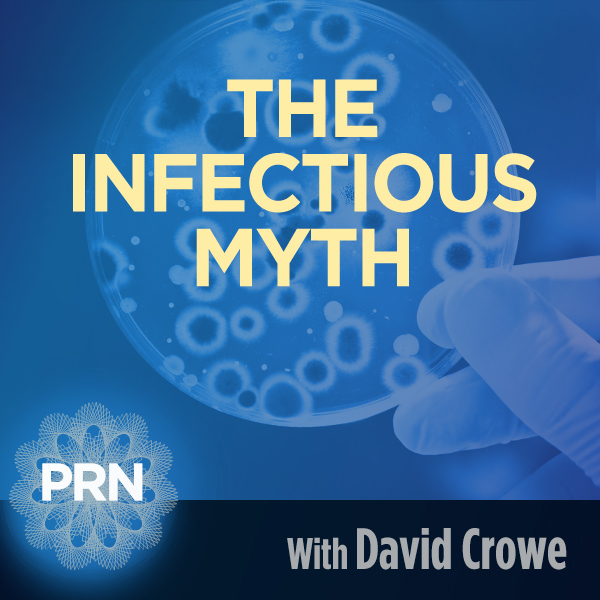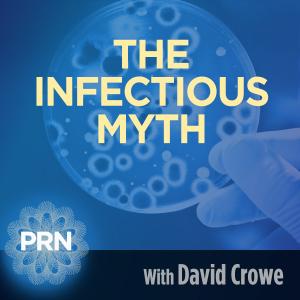
In Episode 6 of "The Infectious Myth" David Crowe interviews Eric Merola, director of three documentaries on people going outside the mainstream on cancer. The first two documentaries are Burzynski, the Movie (2010) and Burzynski: Cancer is Serious Business, Part II (2013), both on Dr. Buzynski of Houston, who has battled for decades with the US FDA to get his non-toxic antineoplastons accepted as a legal cancer therapy. The most recent film, Second Opinion (2014), is about the discovery of Ralph Moss, then in Public Relations at Sloan Kettering Memorial Cancer Centre, that Laetrile was effective in cancer treatment, and that he was supposed to be putting our press releases containing lies.
David and Eric talk about how the highly profitable nature of mainstream cancer therapy distorts the purpose of cancer treatment from helping victims of cancer, to maintaining the profitable status quo. Eric implies that the cancer establishment will have to crumble before major changes in what is allowed for cancer treatment will change in any substantial way in the United States. And that will only occur with a grass-roots revolt against the continuing War on Cancer. This decades only titanic struggle pits toxic treatments against tumors with the cancer patient's body as the battlefield. Even if the patient doesn't die in the process of all out war, they may wonder if it was worth it at the end.
Dr. Burzynski's antineoplastons are natural proteins that he found were present in lower quantities in many cancer patients. He does not claim a perfect success rate, but his successes in previously intractable cases, such as many brain tumors, are vastly greater than the mainstream. Similarly, laetrile is no magic bullet, but it has been scientifically show to have some benefits. Which is more, Merola points out, that can be said for mainstream cancer treatments, which are lightly studied for one type of cancer before approval, and then widely used "off label" after approval.
David describes the current cancer treatment system as a tumor with only one aim – to maintain it's own viability. Like all tumors, it is vulnerable to a change in the environment. And this is where all individuals who educate themselves become antineoplastons (anti-cancer-agents).
For more information on how you can watch Merola's documentaries, see http://ericmerola.com
view more
David and Eric talk about how the highly profitable nature of mainstream cancer therapy distorts the purpose of cancer treatment from helping victims of cancer, to maintaining the profitable status quo. Eric implies that the cancer establishment will have to crumble before major changes in what is allowed for cancer treatment will change in any substantial way in the United States. And that will only occur with a grass-roots revolt against the continuing War on Cancer. This decades only titanic struggle pits toxic treatments against tumors with the cancer patient's body as the battlefield. Even if the patient doesn't die in the process of all out war, they may wonder if it was worth it at the end.
Dr. Burzynski's antineoplastons are natural proteins that he found were present in lower quantities in many cancer patients. He does not claim a perfect success rate, but his successes in previously intractable cases, such as many brain tumors, are vastly greater than the mainstream. Similarly, laetrile is no magic bullet, but it has been scientifically show to have some benefits. Which is more, Merola points out, that can be said for mainstream cancer treatments, which are lightly studied for one type of cancer before approval, and then widely used "off label" after approval.
David describes the current cancer treatment system as a tumor with only one aim – to maintain it's own viability. Like all tumors, it is vulnerable to a change in the environment. And this is where all individuals who educate themselves become antineoplastons (anti-cancer-agents).
For more information on how you can watch Merola's documentaries, see http://ericmerola.com
More Episodes
The Infectious Myth - Ebola, that’s enough! Yes! - 02.07.17
 2017-02-07
2017-02-07
 478
478
 2017-02-07
2017-02-07
 478
478
The Infectious Myth - Bruce Alexander on Addiction - 12.13.16
 2016-12-13
2016-12-13
 4.9k
4.9k
 2016-12-13
2016-12-13
 4.9k
4.9k
012345678910111213141516171819
Create your
podcast in
minutes
- Full-featured podcast site
- Unlimited storage and bandwidth
- Comprehensive podcast stats
- Distribute to Apple Podcasts, Spotify, and more
- Make money with your podcast
It is Free
- Privacy Policy
- Cookie Policy
- Terms of Use
- Consent Preferences
- Copyright © 2015-2024 Podbean.com






